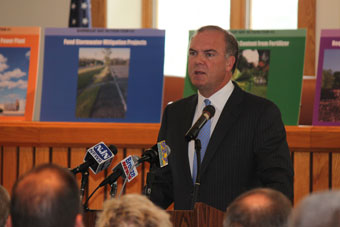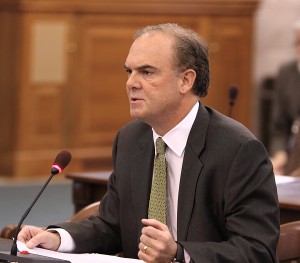[Update: 6/30/11 – While I strongly disagree with their characterization of the Christie plan as “ambitious”, today a superb Asbury Park Press editorial – as we recommended below – calls out DEP Commissioner Bob Martin for spin and frustrating public participation: Stop restricting public discussion –
it would be nice if state environmental commissioner Bob Martin’s public presentations had more public participation and less spin.
As per the typical pattern, I was not even aware of, never mind invited to Martin’s “briefing” session. I wrote this piece based exclusively on the DEP press release and Kirk Moore’s story. Who got invited to the DEP briefing? Was it public noticed? What ENGO issued an alert?
Why would they participate in adn thereby legitimize such a BS forum? I thought the inside Pringle game was over. – end]
Yesterday, DEP issued a press release, ostensibly to provide an update on the “Christie Administration’s Action Plan Toward Long Term Restoration”.
Note the not too subtle insertion of the phrase “long term” in the headline. This is a caveat designed to dampen expectations, dodge performance accountability, and provide an excuse for more delays and lack of effective action.
That “long term” caveat was not included in the Governor’s original plan, which was titled: December 09, 2010 – Governor Christie Fulfills Pledge to Clean Up and Restore Barnegat Bay; Announces Comprehensive Plan of Action. “Action” means action right? Not more study.
Anyway, aside from further politicizing the issue by holding Commissioner Martin’s event in a blatently partisan Republican Ocean County setting, I want to note that the DEP press release touted the following, first among “accomplishments” (note the past tense, as in “done already“):
Some key accomplishments so far, the Commissioner said, include:
- $44 million in grants and loans made available to local governments for nearly 100 projects, primarily upgrades to aging and ineffective stormwater systems;
To back that claim up, DEP even provided a link to a project list – it took some web navigation and 6 clicks to get to it, but did DEP think no one was going to find it and then read it?
It turns out, even a cursory review shows that DEP did not make $44 million available for “nearly 100 projects”.
That is just flat out false.
Which embarrasssed and forced DEP Commissioner Martin to walk back those false claims from his own DEP press release.
Kirk Moore, a fine reporter who reads the documents, fact checks claims, and knows the difference between real money and an “accomplishment” versus a proposed project wish list, quoted Martin:
Some 90 stormwater projects are proposed across the 660-square-mile watershed, and $44 million for those could come soon from the state Legislature, Martin said. Funding for new projects in fiscal year 2012 will increase from $10 million to $17 million, he said.
“We expect to get that approved this week, Martin said. “We only expected about $10 (million) to $15 million”
How many times must DEP be caught spinning before they either stop doing it or are called out by media explicitly for doing it?
In terms of the substantive elements of the DEP status report, I’ve previously criticized the Governor’s vetoes of the stormwater management bill and the TMDL bill and written extensively about flaws in the Governor’s plan.
So, I would make the following new observations now:
1. Here are relevant quotes from a news story two years ago – my sense is that very little on the ground or in regulation, or DEP practices have changed since then:
With Barnegat Bay’s survival in question, action demanded
Friday, July 31, 2009
It’s choked by invasive aquatic weeds, infested with jellyfish and devoid of clams and oysters that used to support an entire shellfish industry.
The Barnegat Bay, which separates mainland Ocean County from a barrier island of seashore towns, has been the subject of numerous studies, all pointing to the slow death of a fragile ecosystem over the last two decades.
“We’ve actually reached a critical threshold where action is required to protect the bay,” said Michael DeLuca, the senior associate director of Rutgers University’s Institute of Marine and Coastal Science. “Now it is clearly time to act.”
Representatives from many environmental groups said state officials have been aware of the bay’s problems for years but have taken no significant steps to correct them.
They worry yesterday’s meeting — like others in the past — will end up being nothing more than lip service from legislators who lack the interest or the political will to save the bay.
As commissioner of the Department of Environmental Protection last year, Lisa Jackson publicly stressed the need to restrict the levels of nitrogen in lawn fertilizers that wash into the bay after rainstorms. Nitrogen promotes the excessive growth of algae and other plants, and deprives water of oxygen for native marine life, a condition known as eutrophication.
Bill Wolfe, executive director of Public Employees for Environmental Responsibility, said neither Jackson — who now heads the federal Environmental Protection Agency — nor her interim replacement, acting Commissioner Mark Mauriello, has addressed the nitrogen issue.
2. Today’s Star Ledger coverage of DEP’s press release and remarks by Commissioner Martin notes that some environmentalists are calling for a development moratorium.
In the abstract, as a matter of policy, that would be great, but practically it is totally unncessary.
Politically, a moratorium is deploying the nuclear option, and politically it is not realistic.
In this economy, there is effectively almost a defacto moratorium, with very little development happening. So a moratorim is not necessary.
So, if a moratorium is an extreme policy measure and it is not needed, why would ENGO’s call for it?
That kind of demand only makes them look extreme and the Governor’s defiant do nothing approach seem reasonable.
Instead of a development moratorium, ENGO’s need to demand that EPA intervene and enforce the Clean Water Act and withold NJ’s federal EPA Clean Water Act funding.
EPA enforcement is required because the Governor of NJ – by vetoing the TMDL bill and not honoring prior DEP TMDL commitments to EPA – is flouting the Clean Water Act.
3. ENGOs’ need to demand that DEP fund and enforce NJ environmental laws and DEP regulations to protect and restore the bay.
Here is the DEP regulatory agenda I laid out, again two years ago.
It should become the set of demands for a unified ENGO community campaign (see: All Quiet on the Regulatory Front – DEP Sits on Sidelines While Barnegat Bay Dies:
If DEP were serious about protecting the bay, they would:
1) adopt enforceable nitrogen standards and enforce nitrogen BMPs in regulatory programs;
2) classify all streams draining to the bay as “Category One” waters, which provide 300 foot wide protected naturally vegetated buffers;
3) enforce cumulative impact standards in the CAFRA coastal permit program to limit the growth of addition soil/vegetation disturbance and new impervious surfaces, pollution sources and water withdrawals;
4) mandate cooling towers at Oyster Creek;
5) adopt the Ocean County Soil Conservation Service study recommendations on soil compaction and modify TR 55 manual to force builders to change site construction and storm water management practices;
6) mandate water conservation measures and cap current water withdrawals;
7) provide technical and financial assistance to Towns;
8 ) enforce the Clean Water Act’s TMDL program
9) restrict new sewers.
More to follow on the other elements in DEP’s status report when I get the time.

